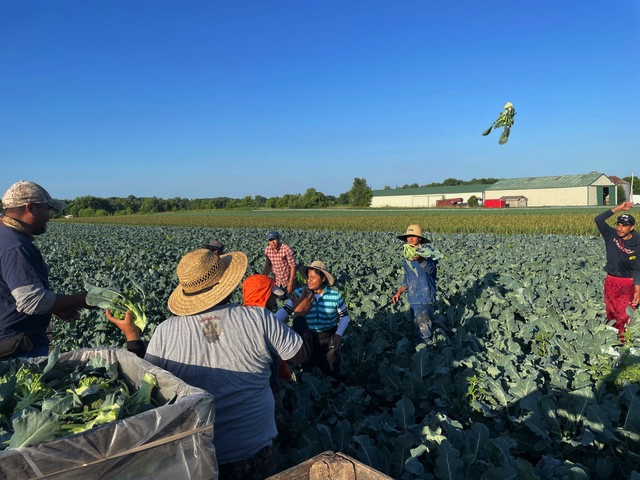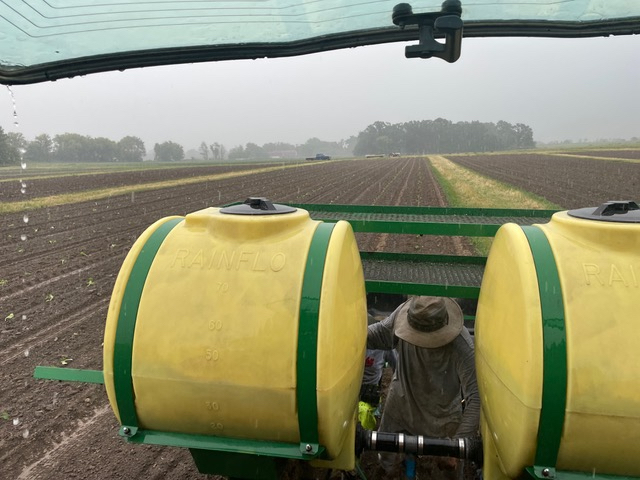Farmer John Writes: The Training of Raining
Harvest Week 2, July 11th – 16th, 2022
Last week’s Farm News contains many of details about being a CSA shareholder, about customizing your box, site protocols, a change in our delivery system, how to flatten your box without destroying it, our crew, etc. Please refer to it if you did not see it last week.
No Farm Field Day this Summer
Our summer Field Day, originally scheduled for July 16th, the 3rd Saturday of July, is cancelled. Sorry if this a letdown. We are quite short on staffing this season and the added effort of hosting a Field Day is more than we should take on. Also, due to the late spring, the U-Pick garden is far from ready. We’ll let you know when you can come harvest from the U-Pick.
Plan on a fabulous Fall Field Day, however, scheduled for the 3rd Saturday of September, September 17th.
Summer Crops
The crops are growing fast now. Zucchini, kohlrabi, turnips and basil were added to the list of available crops for this week. Broccoli, cucumbers, bok choy and cabbage are almost upon us. Happens fast.
Box Substitution Note
We might not have enough lettuce for this week. If this is the case, we will substitute lovely early broccoli for the missing lettuce.
About Pricing and Your Box
Because of how the CSAware customization platform works, we need to assign prices to the vegetables and herbs that you select for your share. This is an awkward process, because we have to get $40 worth of crops into your box without overfilling it. It’s also awkward, because as a CSA farm, we are in theory providing you with an array of vegetables and herbs—not a bunch of individually priced items.
Back to the box—it’s a certain size. The vegetables and herbs that fill it need to have a $40 value. This becomes a volume/price conundrum, because certain crops, such as Chinese cabbage, broccoli, Romaine lettuce, and regular cabbage, take up a lot of space in the box. We actually assign price somewhat in accordance to the size of items. Sometimes we limit the number of large items you can choose. When a box has too many voluminous items in it, we have to add another box for that shareholder and then tape the two boxes together—time consuming and hard to manage when loading pallets with boxes and later delivering them. So, we tend to price large items higher, not necessarily because they are more expensive to grow, but because they occupy more precious space in your box.
Box volume and pricing do not always harmonize well. Usually, but not always, the box with $40 of items comes out full enough, without being too full.
Before we started customizing, our standard was to just fill the box—simple, except that we were sometimes filling the box with certain items that the shareholder did not want.
Rain Trains
Sometimes the weather report will say there is a 100% chance of rain, and it doesn’t rain. Sometimes the weather report says there is zero percent chance of rain, and it rains. So, sometimes it absolutely will rain and it doesn’t rain; or it absolutely won’t rain, and it rains. The weather demands that a whole range of possibilities be considered and honored, but only one of these possibilities comes to pass. It’s good training for life: I might have an opinion—it will rain, or it won’t rain—so what? The weather sometimes matches my opinion, sometimes doesn’t. I might even like my opinion of what the weather will do; the weather carries on irrespective of my opinion. Weather trains me that my weather opinions (and maybe my other opinions) are more for personal entertainment purposes, or, sigh, for ego gratification.
I realize that people like their opinions, that the internet is full of opinions, that much dialogue today is full of opinions. If these people had to live by the weather, then maybe their opinions would be more malleable, more resilient. Being often proved wrong by the weather is a wonderful exercise in the frailty and folly of tightly held opinions.
The trick is to hold at least two conflicting opinions at the same time, and assign them equal status. (This is a good exercise for opinions falling into all sorts of categories.)
“It’s going to rain today,” I announce. “Let’s plan our work accordingly. Or it might not rain; so let’s plan our work accordingly.”
If it’s going to rain today, let’s not irrigate, even though the fields are dry, the air is dry, the sky is dry, the dust swirling in my lungs is dry. Let’s not irrigate, because irrigation takes time to set up and costs money to run. But, what if it doesn’t rain? The corn’s already curling. Maybe we should irrigate, but that’s silly if it rains.
If it’s not going to rain today, we’d better irrigate. But maybe it will rain anyway, pouring an awakening of rain down on our active irrigation system.
This is how we grow your crops, in a flux of knowing, not knowing, guessing, being wrong, being right. Let’s call it being resilient. (Let’s not call it flakey.)
More about Rain
Let’s examine rain more, not if it doesn’t rain, but if it does rain.
Sometimes, it kind-of rains. The rain is just enough to wet the top of the soil. Maybe it’s just enough moisture to germinate your shallow-seeded carrots. The moisture evaporates; the germinated carrots dry out and die.
Sometimes, there is a long, gentle soaking rain. The moisture permeates the soil; it germinates the carrots. The soil does not dry out on top and the carrots continue to grow. They emerge through the soft, moist soil.
Sometimes, the rain pounds down. It smashes the soil, packs it down so the rain that comes after the initial pounding rain cannot penetrate the ground. The water simply runs off. After a heavy violent rain like this, the ground is likely to dry up fast, because the rain didn’t penetrate. The carrots that this sort of rain germinates will try to sprout, but the ground is too packed from the downpour. The sun shines down on the packed soil, baking it, as though it is in a kiln, and the hard crust of the soil prevents the carrots from emerging. But, if it rains again soon after the pouring rain, that crust will soften and let the carrots emerge. Or, we could proactively irrigate to soften the crust, but we don’t want to bother irrigating if it will rain again soon. I’ll add that farming does not allow time to ponder such a decision, turn it over, examine it, discuss it, consult about it, sleep on it, extensively research it. We have to make hundreds of decisions a day. We are always in action. What’s next? What’s after that?
To Know or to Wonder?
Probably the best things about so many decisions to make every day, is that we get to do some things right—a satisfying feeling—and we get to do some things wrong, which often leads to learning something new and which fosters humility. Humility (if it is not allowed to degenerate into self-deprecation) can generate a state of wonder.
Being in this mystery of wonder, of doing, of not doing, of undoing, of certainty and confusion, firmness and malleability, confidence and trepidation, I marvel that we can achieve results that attract such supportive messages as below from our shareholders:
“Thank you to Farmer John and the entire Angelic Organics team for all that you do every day of the year, to provide such wonderful produce to so many households. We are grateful for your expertise and skill, your creativity and wisdom, and your tenacity and labor. Please know that we never take you for granted.
Blessings on you this week, as you harvest and prepare for the first week of deliveries. ❤”
“Just wanted to say that we love our first box of the season! Looking great! Thanks for all you do.
“Beautiful product this year! Awesome delivery from refrigerated truck! Nice! Blessings!
Warmly,
Farmer John






Thank you very much, farmer John and the whole crew at Angelic Organics, for all you do!
We really love what is in our box.